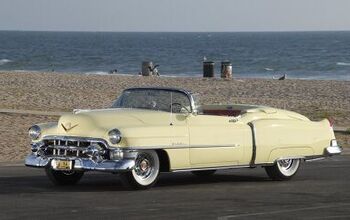How Will Hurricane Helene Impact Auto Insurance, Dealers, and Used Prices?

While natural disasters are something insurance firms have to deal with on a regular basis, some are so serious that they cause the industry to reassess how they offer coverage. Hurricane Helene, which devastated parts of Florida, North Carolina, South Carolina, Georgia, Virginia, Tennessee and even Kentucky, is looking like one of those events. Estimates have the storm causing upwards of $47.5 billion in losses for property owners. Insurance companies, which are in the business of making money, are going to have to cover some of that — with automobiles being second only to houses.
Early estimates have residents sitting on $20-30 billion of uninsured losses due to the fact that some of the affected states aren’t normally prone to flooding. Much of the damage occurred further inland than would be expected from a hurricane, meaning residents and businesses were less prone to have the applicable coverage.
However, that’s only the tip of the iceberg. Estimates for the total economic losses incurred as a result of the hurricane are expected to be closer to $250 billion. But this includes loss of life (the current death toll is somewhere around 200), work stoppages due to sustained power outages, hospital bills for injured residents/rescuers, lapses in tourism, essential infrastructure that needs to be rebuilt (e.g. roads, bridges, phone lines, power stations, water plants, sewers), and just about anything else you can imagine.
As for cars, there’s likely to be a regional deficit for the next several months. Considering that we have examples of entire towns being washed away by flooding, there are plenty of automotive dealerships that didn’t stand a chance. There will also be more people in need of replacement vehicles, spiking demand even further. This may be a good time to remind everyone to triple check the history of any used vehicles they’re considering purchasing, because a bunch of flood-damaged vehicles are about to find their way onto the secondhand market.
And things may soon get much worse. FEMA has announced $210 million in federal assistance for Hurricane Helene, noting that some of that money may likewise be used for Hurricane Milton — which is presently approaching the Gulf Coast.
With the above in mind, insurance firms are allegedly considering revising how they cover things. At the end of the day, insurers want to maintain juicy profit margins and having to payout for coverage cuts into that. Helene may end up encouraging agencies to increase rates or cut coverage for specific areas. Andrew Hoffman, professor of sustainable enterprise at the University of Michigan, recently spoke with Automotive News to that effect.
"It won't be done based on just one storm," Hoffman told the outlet. "It'll be based on their sense of whether this storm reflects a growing trend that they need to be alert to."
From Automotive News:
Hoffman said he would expect to see some changes in insurance coverage as a result of such natural disasters, which would translate directly into how businesses handle their insurance needs.
It could affect auto dealerships, which typically hold a higher level of expensive assets than homeowners, Hoffman said. In dealers' cases, an event such as Helene might cause insurance companies to seek further storm-proofing of a dealership property to protect vehicle inventory.
"We're talking millions of dollars in cars sitting in a car lot," Hoffman said. "We're also talking [about] the business. Their business is now interrupted. Their revenue stream is gone, and they need to access more product to bring to their customers, who are expecting those cars to be there."
One item that adds complexity to the matter is the fact that insurance has effectively become a requirement for owning a vehicle. New York became the first state to pass a compulsory automotive insurance law in 1956. Over the next several decades, that became true for the rest of the nation (minus New Hampshire and Virginia, which require drivers to pay out damages if they don’t have insurance). By making automotive insurance a requirement, U.S. customers expect to be covered — otherwise what are they paying all that money for?
But, unless you have comprehensive coverage, which costs significantly more and isn’t mandatory in any state, you’re not going to be reimbursed for water damage. Even then, how the coverage is applied will be conditional between your individual contract, variances between regions, your deductible, and the conditions under which the vehicle was damaged. The bottom line is that if the insurance agency can find ways not to cover the car, they probably won’t. Meanwhile, odds are good that rates are going to increase in general next year as overall coverage shrinks a tad.
That said, it probably won’t be individual policyholders that will be seeing the biggest changes moving forward. Most of the discussions taking place within the insurance industry seem to revolve around commercial policies, with residential contracts being secondary.
For dealers, the hurricane can be viewed as a massive windfall or major disaster. It all depends on the kind of losses they took and whether or not it will be covered. Local residents will need new vehicles regardless and a retailer with untouched inventories will be well positioned. But the same cannot be said for dealerships that had vehicles submerged in floodwaters and are having trouble getting their insurance provider to offer the maximum coverage.
Wards Auto offered an assessment of the overarching situation, noting that there will be a period where surviving dealerships won’t have sufficient inventories to satisfy demand in the impacted states. This will be followed by a stint where vehicles will come in at prices many local residents may not be able to afford. Keep in mind that the average American already cannot afford to buy a new vehicle and many of the areas hit hardest by the storm tended to be poor.
“A lot of the places where there was a lot of destruction, it is people that are lower income,” Todd Caputo, president of Todd Caputo Consulting, told Wards. “They are not going to be buying or replacing their cars with a late model used car or brand-new car. They are going to be looking for cars under $10,000 or even $5,000.”
Those are already hard to come in decent shape in places that weren’t just hit by a natural disaster. Finding one in the states suffering the worst under the storm may soon border on a miracle. However, price increases probably won’t be region locked. Despite the United States approaching a point where swelling vehicle inventories were starting to bring down the valuation of some models, this storm will be pushing things in the opposite direction. The deals will just be worse in areas where people are the most desperate.
Nobody wants to hear that the light at the end of the tunnel is just going to get further away. But that’s likely to be the case. Used vehicles (especially those allocated to areas hit by the hurricane) are probably going to be getting even more expensive this year and insurance rates look poised to increase for 2025. Although, that’s not wholly the fault of Hurricane Helene.
Some of the price increases we’ve seen in recent years are simply the result of manufacturers prioritizing higher-margin vehicles and dealerships knowing they could get away with markups. Meanwhile, the percentage of uninsured drivers in the United States has ballooned since 2019 when it was hovering around 11 percent. Rising costs have been attributed as the largest single factor, with certain states (e.g. New Mexico, Mississippi, Tennessee) now estimated to have over 20 percent of their population driving around without insurance. Sadly, fewer motorists bothering to buy insurance will likewise be used as an excuse to raise rates on those that do.
[Image: Adansijav Official/Shutterstock]
Become a TTAC insider. Get the latest news, features, TTAC takes, and everything else that gets to the truth about cars first by subscribing to our newsletter.

Consumer advocate tracking industry trends and regulations. Before joining TTAC, Matt spent a decade working for marketing and research firms based in NYC. Clients included several of the world’s largest automakers, global tire brands, and aftermarket part suppliers. Dissatisfied, he pivoted to writing about cars. Since then, he has become an ardent supporter of the right-to-repair movement, been interviewed about the automotive sector by national broadcasts, participated in a few amateur rallying events, and driven more rental cars than anyone ever should. Handy with a wrench, Matt grew up surrounded by Detroit auto workers and learned to drive by twelve. A contrarian, Matt claims to prefer understeer and motorcycles.
More by Matt Posky
Latest Car Reviews
Read moreLatest Product Reviews
Read moreRecent Comments
- FreedMike Man...a storm like this doing a direct hit on a major metro area is going to be an absolute catastrophe. God help the folks down there.
- Kwik_Shift_Pro4X When I learned of the Kei trucks, particularly the Subaru Sambar, it was compelling, but too risky and costly in the end. My local Subaru dealer wouldn't support it.
- MrIcky Having worked several catastrophes for insurance, the following "The bottom line is that if the insurance agency can find ways not to cover the car, they probably won’t." just isn't the way it works. The insurance company will have some drop off areas where cars will be brought. The adjuster will check for water height and draw a line at the high water point with a posca marker. If that line is generally over the electronics- bam, it's totaled, if you have comprehensive they look up your car on KBB and/or NADA by mileage and write a check. Most comprehensive vehicle policies look almost exactly the same-at least for "standard" carriers. If the water line isn't over the electronics, then it generally goes to a shop to get tested. You aren't going to get gamed for a car in a cat loss scenario because there just isn't time to f'with it. After a Houston flooding event I worked 16 hour days for 2 weeks under a big tent like you'd set up for a wedding and went over nearly 100 cars/day taking pictures and sorting them into total or check with mechanic "piles". Most people who had totaled vehicles had a check within 20 minutes of me looking at their car. Buildings on the other hand have all sorts of different terms (commercial or consumer) with regard to how the wind or water entered your building and whether coverage applies.
- Theflyersfan Well, Milton just went from a tropical storm to 175mph in less than a day so this guy means business. Even if it weakens a little bit, it'll expand and pretty much all of Florida south of Jacksonville is going to feel something. Everyone who saw that disaster in the NC/VA/TN mountains before Helene's landfall is either from the future or a liar (and that includes the insurance companies) because heavy rain started well before the storm arrived and then the crazy thing just sat in that general area. My part of Kentucky - it didn't stop raining for almost five days. And now this nuclear bomb of a hurricane. I understand Florida has a high percentage of homeowners without insurance because they can no longer afford it. My parents have a home near Naples and they carry extra flood and wind coverage and that costs well over five digits per year. Home renovations about 8-9 years ago gave them the chance to make hurricane-proof changes like lashing the roof and hurricane windows. It survived the direct hit from Irma and the heavy punch from Ian so they worked. After this storm, I don't know how Florida will totally recover. Much like California and the earthquakes and firestorms, there might have to be a "Come to Jesus" talk with the perils of living in Florida. I'm already making plans to head down there post-storm if the roads or airport is open in the days following landfall to help cleanup and rebuild any part of the home that might need it. In the short term, if it hasn't happened already, gas prices are probably going to rocket upwards as the oil rigs in the Gulf shut down and prepare. And if this storm directly hits Tampa/St Pete, it's going to be game over in those cities for a while. And imagine if the storm at this power was aiming towards New Orleans or Miami.
- Jalop1991 "...leaving Doherty and his passenger to be pulled from the wreck by passersby." Or not. I would get a HUGE laugh out of seeing a video of passersby with their phones whipped out, recording it and doing nothing else.


































Comments
Join the conversation
My biggest concern…is this going to screw up my cruise out of Miami during the holidays? Thoughts and prayers….
It may regionally but overall it won't have much of an effect. Storms happen, they'll just make more